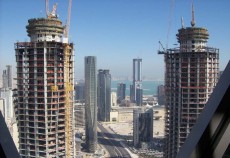Korean contracting giant Samsung Engineering is preparing to bid for the upcoming metro projects across the GCC.

The company has expressed its firm interest in metro projects in Abu Dhabi, Doha, Saudi Arabia and Bahrain, and may also be preparing to bid for the proposed Purple Line of the Dubai Metro. (www.abu-dhabi-metro.com)
“We want to participate in the railway projects in the GCC and the North Africa region,” Samsung business development manager for the Mena region, Muntae Suh told Construction Week.
“If the project is big, [such as] a multi-billion dollar project like the Purple Line of the Dubai Metro, we would consider bidding as the leading member of a consortium.”
Samsung Engineering currently has at least 31 major projects ongoing in Korea, including railway lines and railway maintenance workshops, and various other projects worldwide, including a number in Saudi Arabia.
“We are focused on the railway system work itself,” Suh said, adding that the firm would seek a role similar to that undertaken by Mitsubishi Heavy Industries on the Dubai Metro, which is leading the consortium constructing the line.
Of all the GCC metro projects that are yet to break ground, the Doha metro is the most advanced. (www.doha-metro.com)
“The plan was very well received by the public as well as other sectors,” Doha-based Barwa president of strategy and investment Dr Yousif Al Horr, who is familiar with the project, said.
“The total investment will be huge. Part of the grid will run underground, which will resolve a lot of the traffic issues now faced in Qatar.”
In Abu Dhabi, the contract for construction of the metro system will be tendered in 2011 once a feasibility study has been carried out, according to the Department of Transport.
The feasibility study will investigate whether the system will run above or below ground.
Meanwhile, Suh also revealed that one of Samsung’s Dubai projects – a sewerage treatment facility in Nakheel’s International City – has been scaled back 50% by the master-developer “because of the economic crisis.”
by Jamie Stewart Apr 21, 2009, http://www.constructionweekonline.com
















